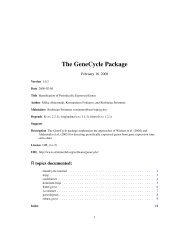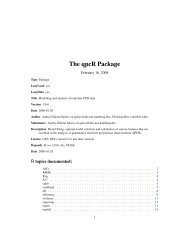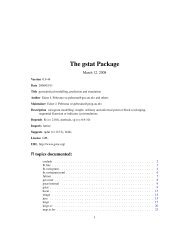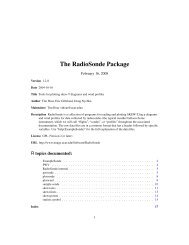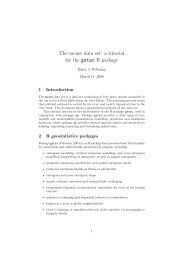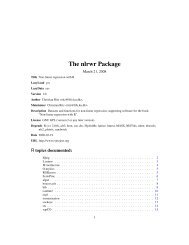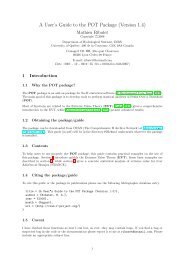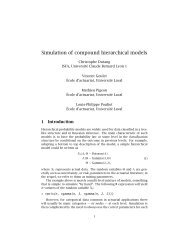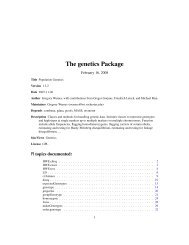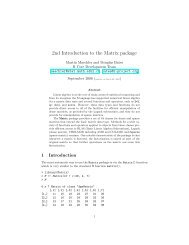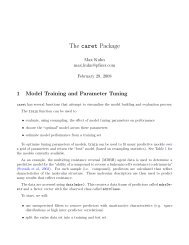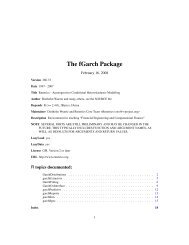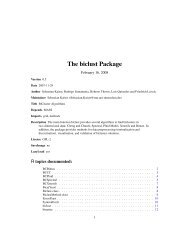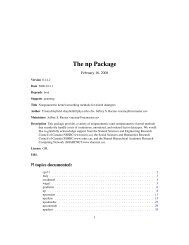The distrEx Package - NexTag Supports Open Source Initiatives
The distrEx Package - NexTag Supports Open Source Initiatives
The distrEx Package - NexTag Supports Open Source Initiatives
You also want an ePaper? Increase the reach of your titles
YUMPU automatically turns print PDFs into web optimized ePapers that Google loves.
<strong>The</strong> <strong>distrEx</strong> <strong>Package</strong><br />
February 16, 2008<br />
Version 1.9<br />
Date 2007-07-29<br />
Title Extensions of package distr<br />
Description Extensions of package distr and some additional functionality<br />
Depends R(>= 2.2.0), methods, distr(>= 1.9), evd, startupmsg<br />
Suggests tcltk<br />
Author Matthias Kohl, Peter Ruckdeschel<br />
Maintainer Matthias Kohl <br />
SaveImage no<br />
LazyLoad yes<br />
License GPL (version 2 or later)<br />
URL http://www.uni-bayreuth.de/departments/math/org/mathe7/DISTR/<br />
R topics documented:<br />
<strong>distrEx</strong>-package . . . . . . . . . . . . . . . . . . . . . . . . . . . . . . . . . . . . . . . 2<br />
AbscontCondDistribution-class . . . . . . . . . . . . . . . . . . . . . . . . . . . . . . . 6<br />
Condition-class . . . . . . . . . . . . . . . . . . . . . . . . . . . . . . . . . . . . . . . 7<br />
ContaminationSize . . . . . . . . . . . . . . . . . . . . . . . . . . . . . . . . . . . . . 8<br />
ConvexContamination . . . . . . . . . . . . . . . . . . . . . . . . . . . . . . . . . . . 9<br />
DiscreteCondDistribution-class . . . . . . . . . . . . . . . . . . . . . . . . . . . . . . . 11<br />
DiscreteMVDistribution-class . . . . . . . . . . . . . . . . . . . . . . . . . . . . . . . 12<br />
DiscreteMVDistribution . . . . . . . . . . . . . . . . . . . . . . . . . . . . . . . . . . 13<br />
E . . . . . . . . . . . . . . . . . . . . . . . . . . . . . . . . . . . . . . . . . . . . . . . 14<br />
EuclCondition-class . . . . . . . . . . . . . . . . . . . . . . . . . . . . . . . . . . . . . 19<br />
EuclCondition . . . . . . . . . . . . . . . . . . . . . . . . . . . . . . . . . . . . . . . . 20<br />
GLIntegrate . . . . . . . . . . . . . . . . . . . . . . . . . . . . . . . . . . . . . . . . . 20<br />
Gumbel-class . . . . . . . . . . . . . . . . . . . . . . . . . . . . . . . . . . . . . . . . 21<br />
1
2 <strong>distrEx</strong>-package<br />
Gumbel . . . . . . . . . . . . . . . . . . . . . . . . . . . . . . . . . . . . . . . . . . . 23<br />
GumbelParameter-class . . . . . . . . . . . . . . . . . . . . . . . . . . . . . . . . . . . 24<br />
HellingerDist . . . . . . . . . . . . . . . . . . . . . . . . . . . . . . . . . . . . . . . . 25<br />
illustrateCLT . . . . . . . . . . . . . . . . . . . . . . . . . . . . . . . . . . . . . . . . 27<br />
illustrateLLN . . . . . . . . . . . . . . . . . . . . . . . . . . . . . . . . . . . . . . . . 28<br />
KolmogorovDist . . . . . . . . . . . . . . . . . . . . . . . . . . . . . . . . . . . . . . 30<br />
LMCondDistribution . . . . . . . . . . . . . . . . . . . . . . . . . . . . . . . . . . . . 32<br />
LMParameter-class . . . . . . . . . . . . . . . . . . . . . . . . . . . . . . . . . . . . . 33<br />
LMParameter . . . . . . . . . . . . . . . . . . . . . . . . . . . . . . . . . . . . . . . . 34<br />
MultivariateDistribution-class . . . . . . . . . . . . . . . . . . . . . . . . . . . . . . . 35<br />
PrognCondDistribution-class . . . . . . . . . . . . . . . . . . . . . . . . . . . . . . . . 36<br />
PrognCondition-class . . . . . . . . . . . . . . . . . . . . . . . . . . . . . . . . . . . . 37<br />
TotalVarDist . . . . . . . . . . . . . . . . . . . . . . . . . . . . . . . . . . . . . . . . . 38<br />
UnivariateCondDistribution-class . . . . . . . . . . . . . . . . . . . . . . . . . . . . . . 40<br />
var . . . . . . . . . . . . . . . . . . . . . . . . . . . . . . . . . . . . . . . . . . . . . . 41<br />
dim-methods . . . . . . . . . . . . . . . . . . . . . . . . . . . . . . . . . . . . . . . . 50<br />
<strong>distrEx</strong>Integrate . . . . . . . . . . . . . . . . . . . . . . . . . . . . . . . . . . . . . . . 50<br />
<strong>distrEx</strong>MASK . . . . . . . . . . . . . . . . . . . . . . . . . . . . . . . . . . . . . . . . 52<br />
<strong>distrEx</strong>Options . . . . . . . . . . . . . . . . . . . . . . . . . . . . . . . . . . . . . . . 53<br />
liesInSupport . . . . . . . . . . . . . . . . . . . . . . . . . . . . . . . . . . . . . . . . 54<br />
m1df . . . . . . . . . . . . . . . . . . . . . . . . . . . . . . . . . . . . . . . . . . . . . 55<br />
m2df . . . . . . . . . . . . . . . . . . . . . . . . . . . . . . . . . . . . . . . . . . . . . 56<br />
make01 . . . . . . . . . . . . . . . . . . . . . . . . . . . . . . . . . . . . . . . . . . . 58<br />
plotCLT . . . . . . . . . . . . . . . . . . . . . . . . . . . . . . . . . . . . . . . . . . . 59<br />
Index 60<br />
<strong>distrEx</strong>-package<br />
<strong>distrEx</strong> – Extensions of package distr<br />
Description<br />
<strong>distrEx</strong> proides some extensions of package distr:<br />
• extreme value distribution classes,<br />
• expectations in the form<br />
– E(X) for the expectation of a distribution object X<br />
– E(X,f) for the expectation of f(X) where X is some distribution object and f some<br />
function in X<br />
• further functionals: var, sd, IQR, mad, median, skewness, kurtosis<br />
• truncated moments,<br />
• distances between distributions (Hellinger, Kolmogorov, total variation, "convex contamination")<br />
• lists of distributions,<br />
• conditional distributions in factorized form<br />
• conditional expectations in factorized form
<strong>distrEx</strong>-package 3<br />
Details<br />
<strong>Package</strong>: <strong>distrEx</strong><br />
Version: 1.9<br />
Date: 2007-07-29<br />
Depends: R(>= 2.2.0), methods, distr(>= 1.8), evd, startupmsg<br />
Suggests: tcltk<br />
SaveImage: no<br />
LazyLoad: yes<br />
License: GPL (version 2 or later)<br />
URL: http://www.uni-bayreuth.de/departments/math/org/mathe7/DISTR/<br />
Classes<br />
Distribution Classes<br />
"Distribution" (from distr)<br />
|>"UnivariateDistribution" (from distr)<br />
|>|>"AbscontDistribution" (from distr)<br />
|>|>|>"Gumbel"<br />
|>"MultivariateDistribution"<br />
|>|>"DiscreteMVDistribution-class"<br />
|>"UnivariateCondDistribution"<br />
|>|>"AbscontCondDistribution"<br />
|>|>|>"PrognCondDistribution"<br />
|>|>"DiscreteCondDistribution"<br />
Condition Classes<br />
"Condition"<br />
|>"EuclCondition"<br />
|>"PrognCondition"<br />
Parameter Classes<br />
"OptionalParameter" (from distr)<br />
|>"Parameter" (from distr)<br />
|>|>"LMParameter"<br />
|>|>"GumbelParameter"<br />
Functions<br />
Integration:
4 <strong>distrEx</strong>-package<br />
GLIntegrate<br />
<strong>distrEx</strong>Integrate<br />
Options:<br />
<strong>distrEx</strong>Options<br />
Standardization:<br />
make01<br />
Gauss-Legendre quadrature<br />
Integration of one-dimensional functions<br />
Function to change the global variables of the<br />
package '<strong>distrEx</strong>'<br />
Centering and standardization of univariate<br />
distributions<br />
Generating Functions<br />
Distribution Classes<br />
ConvexContamination<br />
DiscreteMVDistribution<br />
Gumbel<br />
LMCondDistribution<br />
Condition Classes<br />
EuclCondition<br />
Parameter Classes<br />
LMParameter<br />
Generic function for generating convex<br />
contaminations<br />
Generating function for<br />
DiscreteMVDistribution-class<br />
Generating function for Gumbel-class<br />
Generating function for the conditional<br />
distribution of a linear regression model.<br />
Generating function for EuclCondition-class<br />
Generating function for LMParameter-class<br />
Methods<br />
Distances:<br />
ContaminationSize<br />
HellingerDist<br />
KolmogorovDist<br />
TotalVarDist<br />
liesInSupport<br />
Generic function for the computation of the<br />
convex contamination (Pseudo-)distance of two<br />
distributions<br />
Generic function for the computation of the<br />
Hellinger distance of two distributions<br />
Generic function for the computation of the<br />
Kolmogorov distance of two distributions<br />
Generic function for the computation of the<br />
total variation distance of two distributions<br />
Generic function for testing the support of a<br />
distribution<br />
Functionals:
<strong>distrEx</strong>-package 5<br />
E<br />
var<br />
IQR<br />
sd<br />
mad<br />
median<br />
skewness<br />
kurtosis<br />
Generic function for the computation of<br />
(conditional) expectations<br />
Generic functions for the computation of<br />
functionals<br />
Generic functions for the computation of<br />
functionals<br />
Generic functions for the computation of<br />
functionals<br />
Generic functions for the computation of<br />
functionals<br />
Generic functions for the computation of<br />
functionals<br />
Generic functions for the computation of<br />
functionals<br />
Generic functions for the computation of<br />
Functionals<br />
truncated Moments:<br />
m1df<br />
m2df<br />
illustration:<br />
illustrateLLT<br />
illustrateCLT<br />
plotCLT<br />
Generic function for the computation of clipped<br />
first moments<br />
Generic function for the computation of clipped<br />
second moments<br />
function for the generation of LLN - visualizations<br />
function for the generation of CLT - visualizations<br />
Generic function for the plotting of CLT-approximations<br />
Demos<br />
Demos are available — see demo(package="<strong>distrEx</strong>").<br />
Acknowledgement<br />
G. Jay Kerns, 〈gkerns@ysu.edu〉, has provided a major contribution, in particular the functionals<br />
skewness and kurtosis are due to him.<br />
Start-up-Banner<br />
You may suppress the start-up banner/message completely by setting options("StartupBanner"="off")<br />
somewhere before loading this package by library or require in your R-code / R-session.<br />
If option "StartupBanner" is not defined (default) or setting options("StartupBanner"=NULL)<br />
or options("StartupBanner"="complete") the complete start-up banner is displayed.<br />
For any other value of option "StartupBanner" (i.e., not in c(NULL,"off","complete"))<br />
only the version information is displayed.
6 <strong>distrEx</strong>-package<br />
<strong>The</strong> same can be achieved by wrapping the library or require call into either suppressStartupMessages()<br />
or onlytypeStartupMessages(.,atypes="version").<br />
As for general packageStartupMessage’s, you may also suppress all the start-up banner<br />
by wrapping the library or require call into suppress<strong>Package</strong>StartupMessages()<br />
from startupmsg-version 0.5 on.<br />
Note<br />
Some functions of package stats have intentionally been masked, but completely retain their functionality<br />
— see <strong>distrEx</strong>MASK().<br />
If any of the packages e1071, moments, fBasics is to be used together with <strong>distrEx</strong> the latter must<br />
be attached after any of the first mentioned. Otherwise kurtosis() and skewness() defined<br />
as methods in <strong>distrEx</strong> may get masked.<br />
To re-mask, you may use kurtosis
AbscontCondDistribution-class 7<br />
AbscontCondDistribution-class<br />
Absolutely continuous conditional distribution<br />
Description<br />
<strong>The</strong> class of absolutely continuous conditional univariate distributions.<br />
Objects from the Class<br />
Objects can be created by calls of the form new("AbscontCondDistribution", ...).<br />
Slots<br />
cond: Object of class "Condition": condition<br />
img: Object of class "rSpace": the image space.<br />
param: Object of class "OptionalParameter": an optional parameter.<br />
r: Object of class "function": generates random numbers.<br />
d: Object of class "OptionalFunction": optional conditional density function.<br />
p: Object of class "OptionalFunction": optional conditional cumulative distribution function.<br />
q: Object of class "OptionalFunction": optional conditional quantile function.<br />
.withArith: logical: used internally to issue warnings as to interpretation of arithmetics<br />
.withSim: logical: used internally to issue warnings as to accuracy<br />
Extends<br />
Class "UnivariateCondDistribution", directly.<br />
Class "Distribution", by class "UnivariateCondDistribution".<br />
Author(s)<br />
Matthias Kohl 〈Matthias.Kohl@stamats.de〉<br />
See Also<br />
UnivariateCondDistribution-class, Distribution-class<br />
Examples<br />
new("AbscontCondDistribution")
8 ContaminationSize<br />
Condition-class<br />
Conditions<br />
Description<br />
<strong>The</strong> class of conditions.<br />
Objects from the Class<br />
Objects can be created by calls of the form new("Condition", ...).<br />
Slots<br />
name: Object of class "character": name of the condition<br />
Methods<br />
name signature(object = "Condition"): accessor function for slot name.<br />
name
ContaminationSize 9<br />
Usage<br />
ContaminationSize(e1, e2, ...)<br />
## S4 method for signature 'AbscontDistribution,<br />
## AbscontDistribution':<br />
ContaminationSize(e1,e2)<br />
## S4 method for signature 'DiscreteDistribution,<br />
## DiscreteDistribution':<br />
ContaminationSize(e1,e2)<br />
Arguments<br />
e1<br />
e2<br />
object of class "Distribution"<br />
object of class "Distribution"<br />
... further arguments to be used in particular methods (not in package <strong>distrEx</strong>)<br />
Details<br />
Computes the distance from e1 to e2 respectively P to Q. This is not really a distance as it is not<br />
symmetric!<br />
Value<br />
A list containing the following components:<br />
e1<br />
object of class "Distribution"; ideal distribution<br />
e2<br />
object of class "Distribution"; ’contaminated’ distribution<br />
size.of.contamination<br />
size of contamination<br />
Methods<br />
e1 = "AbscontDistribution", e2 = "AbscontDistribution": convex contamination (pseudo-)distance<br />
of two absolutely continuous univariate distributions.<br />
e1 = "DiscreteDistribution", e2 = "DiscreteDistribution": convex contamination (pseudo-)distance<br />
of two discrete univariate distributions.<br />
Author(s)<br />
Matthias Kohl 〈Matthias.Kohl@stamats.de〉<br />
References<br />
Huber, P.J. (1981) Robust Statistics. New York: Wiley.<br />
See Also<br />
KolmogorovDist, TotalVarDist, HellingerDist, Distribution-class
10 ConvexContamination<br />
Examples<br />
ContaminationSize(Norm(), Norm(mean=0.1))<br />
ContaminationSize(Pois(), Pois(1.5))<br />
ConvexContamination<br />
Generic Function for Generating Convex Contaminations<br />
Description<br />
Generic function for generating convex contaminations. This is also known as gross error model.<br />
Given two distributions P (ideal distribution), R (contaminating distribution) and the size ε ∈ [0, 1]<br />
the convex contaminated distribution<br />
is generated.<br />
Q = (1 − ε)P + εR<br />
Usage<br />
ConvexContamination(e1, e2, size)<br />
Arguments<br />
e1<br />
e2<br />
size<br />
object of class "Distribution": ideal distribution<br />
object of class "Distribution": contaminating distribution<br />
size of contamination (amount of gross errors)<br />
Value<br />
Object of class "Distribution".<br />
Methods<br />
e1 = "UnivariateDistribution", e2 = "UnivariateDistribution", size = "numeric": convex combination<br />
of two univariate distributions<br />
e1 = "AbscontDistribution", e2 = "AbscontDistribution", size = "numeric": convex combination<br />
of two absolutely continuous univariate distributions<br />
e1 = "DiscreteDistribution", e2 = "DiscreteDistribution", size = "numeric": convex combination<br />
of two discrete univariate distributions<br />
Author(s)<br />
Matthias Kohl 〈Matthias.Kohl@stamats.de〉
DiscreteCondDistribution-class 11<br />
References<br />
Huber, P.J. (1981) Robust Statistics. New York: Wiley.<br />
See Also<br />
ContaminationSize, Distribution-class<br />
Examples<br />
# Convex combination of two normal distributions<br />
C1
12 DiscreteMVDistribution-class<br />
Author(s)<br />
Matthias Kohl 〈Matthias.Kohl@stamats.de〉<br />
See Also<br />
UnivariateCondDistribution-class<br />
Examples<br />
new("DiscreteCondDistribution")<br />
DiscreteMVDistribution-class<br />
Discrete Multivariate Distributions<br />
Description<br />
<strong>The</strong> class of discrete multivariate distributions.<br />
Objects from the Class<br />
Slots<br />
Objects can be created by calls of the form new("DiscreteMVDistribution", ...).<br />
More frequently they are created via the generating function DiscreteMVDistribution.<br />
Extends<br />
img: Object of class "rSpace". Image space of the distribution. Usually an object of class<br />
"EuclideanSpace".<br />
param: Object of class "OptionalParameter". Optional parameter of the multivariate distribution.<br />
r: Object of class "function": generates (pseudo-)random numbers<br />
d: Object of class "OptionalFunction": optional density function<br />
p: Object of class "OptionalFunction": optional cumulative distribution function<br />
q: Object of class "OptionalFunction": optional quantile function<br />
support: numeric matrix whose rows form the support of the distribution<br />
Class "MultivariateDistribution", directly.<br />
Class "Distribution", by class "MultivariateDistribution".<br />
Methods<br />
support signature(object = "DiscreteMVDistribution"): accessor function for<br />
slot support.
DiscreteMVDistribution 13<br />
Author(s)<br />
Matthias Kohl 〈Matthias.Kohl@stamats.de〉<br />
See Also<br />
Distribution-class, MultivariateDistribution-class, DiscreteMVDistribution,<br />
E-methods<br />
Examples<br />
(D1
14 E<br />
Value<br />
Object of class "DiscreteMVDistribution"<br />
Author(s)<br />
See Also<br />
Matthias Kohl 〈Matthias.Kohl@stamats.de〉<br />
DiscreteMVDistribution-class<br />
Examples<br />
# Dirac-measure at (0,0,0)<br />
D1
E 15<br />
E(object)<br />
## S4 method for signature 'MultivariateDistribution,<br />
## function, missing':<br />
E(object, fun, cond, useApply = TRUE, ...)<br />
## S4 method for signature 'DiscreteMVDistribution,<br />
## function, missing':<br />
E(object, fun, cond, useApply = TRUE, ...)<br />
## S4 method for signature 'AbscontCondDistribution,<br />
## missing, numeric':<br />
E(object, cond, useApply = TRUE)<br />
## S4 method for signature 'DiscreteCondDistribution,<br />
## missing, numeric':<br />
E(object, cond, useApply = TRUE)<br />
## S4 method for signature 'UnivariateCondDistribution,<br />
## function, numeric':<br />
E(object, fun, cond, withCond = FALSE, useApply = TRUE, ...)<br />
## S4 method for signature 'AbscontCondDistribution,<br />
## function, numeric':<br />
E(object, fun, cond, withCond = FALSE, useApply = TRUE, ...)<br />
## S4 method for signature 'DiscreteCondDistribution,<br />
## function, numeric':<br />
E(object, fun, cond, withCond = FALSE, useApply = TRUE, ...)<br />
## S4 method for signature 'DiscreteCondDistribution,<br />
## function, numeric':<br />
E(object, fun, cond, withCond = FALSE, useApply = TRUE, ...)<br />
## S4 method for signature 'Beta, missing, missing':<br />
E(object, fun, cond)<br />
## S4 method for signature 'Binom, missing, missing':<br />
E(object, fun, cond)<br />
## S4 method for signature 'Cauchy, missing, missing':<br />
E(object, fun, cond)<br />
## S4 method for signature 'Chisq, missing, missing':<br />
E(object, fun, cond)<br />
## S4 method for signature 'Dirac, missing, missing':<br />
E(object, fun, cond)<br />
## S4 method for signature 'DExp, missing, missing':<br />
E(object, fun, cond)<br />
## S4 method for signature 'Exp, missing, missing':<br />
E(object, fun, cond)
16 E<br />
## S4 method for signature 'Fd, missing, missing':<br />
E(object, fun, cond)<br />
## S4 method for signature 'Gammad, missing, missing':<br />
E(object, fun, cond)<br />
## S4 method for signature 'Geom, missing, missing':<br />
E(object, fun, cond)<br />
## S4 method for signature 'Hyper, missing, missing':<br />
E(object, fun, cond)<br />
## S4 method for signature 'Logis, missing, missing':<br />
E(object, fun, cond)<br />
## S4 method for signature 'Lnorm, missing, missing':<br />
E(object, fun, cond)<br />
## S4 method for signature 'Nbinom, missing, missing':<br />
E(object, fun, cond)<br />
## S4 method for signature 'Norm, missing, missing':<br />
E(object, fun, cond)<br />
## S4 method for signature 'Pois, missing, missing':<br />
E(object, fun, cond)<br />
## S4 method for signature 'Unif, missing, missing':<br />
E(object, fun, cond)<br />
## S4 method for signature 'Td, missing, missing':<br />
E(object, fun, cond)<br />
## S4 method for signature 'Weibull, missing, missing':<br />
E(object, fun, cond)<br />
Arguments<br />
object<br />
fun<br />
Details<br />
Value<br />
cond<br />
object of class "Distribution"<br />
if missing the (conditional) expectation is computed else the (conditional) expection<br />
of fun is computed.<br />
if not missing the conditional expectation given cond is computed.<br />
... additional arguments to fun<br />
useApply<br />
withCond<br />
logical: should sapply, respectively apply be used to evaluate fun.<br />
logical: is cond in the argument list of fun.<br />
<strong>The</strong> precision of the computations can be controlled via certain global options; cf. <strong>distrEx</strong>Options.<br />
<strong>The</strong> (conditional) expectation is computed.<br />
Methods<br />
object = "UnivariateDistribution", fun = "missing", cond = "missing": expectation of univariate<br />
distributions using crude Monte-Carlo integration.
E 17<br />
object = "AbscontDistribution", fun = "missing", cond = "missing": expectation of absolutely<br />
continuous univariate distributions using <strong>distrEx</strong>Integrate.<br />
object = "DiscreteDistribution", fun = "missing", cond = "missing": expectation of discrete univariate<br />
distributions using support and sum.<br />
object = "MultivariateDistribution", fun = "missing", cond = "missing": expectation of multivariate<br />
distributions using crude Monte-Carlo integration.<br />
object = "DiscreteMVDistribution", fun = "missing", cond = "missing": expectation of discrete<br />
multivariate distributions. <strong>The</strong> computation is based on support and sum.<br />
object = "UnivariateDistribution", fun = "function", cond = "missing": expectation of fun under<br />
univariate distributions using crude Monte-Carlo integration.<br />
object = "AbscontDistribution", fun = "function", cond = "missing": expectation of fun under<br />
absolutely continuous univariate distributions using <strong>distrEx</strong>Integrate.<br />
object = "DiscreteDistribution", fun = "function", cond = "missing": expectation of fun under<br />
discrete univariate distributions using support and sum.<br />
object = "MultivariateDistribution", fun = "function", cond = "missing": expectation of multivariate<br />
distributions using crude Monte-Carlo integration.<br />
object = "DiscreteMVDistribution", fun = "function", cond = "missing": expectation of fun<br />
under discrete multivariate distributions. <strong>The</strong> computation is based on support and sum.<br />
object = "UnivariateCondDistribution", fun = "missing", cond = "numeric": conditional expectation<br />
for univariate conditional distributions given cond. <strong>The</strong> integral is computed using<br />
crude Monte-Carlo integration.<br />
object = "AbscontCondDistribution", fun = "missing", cond = "numeric": conditional expectation<br />
for absolutely continuous, univariate conditional distributions given cond. <strong>The</strong> computation<br />
is based on <strong>distrEx</strong>Integrate.<br />
object = "DiscreteCondDistribution", fun = "missing", cond = "numeric": conditional expectation<br />
for discrete, univariate conditional distributions given cond. <strong>The</strong> computation is based<br />
on support and sum.<br />
object = "UnivariateCondDistribution", fun = "function", cond = "numeric": conditional expectation<br />
of fun under univariate conditional distributions given cond. <strong>The</strong> integral is computed<br />
using crude Monte-Carlo integration.<br />
object = "AbscontCondDistribution", fun = "function", cond = "numeric": conditional expectation<br />
of fun under absolutely continuous, univariate conditional distributions given cond.<br />
<strong>The</strong> computation is based on <strong>distrEx</strong>Integrate.<br />
object = "DiscreteCondDistribution", fun = "function", cond = "numeric": conditional expectation<br />
of fun under discrete, univariate conditional distributions given cond. <strong>The</strong> computation<br />
is based on support and sum.<br />
object = "Beta", fun = "missing", cond = "missing": for noncentrality 0 exact evaluation using<br />
explicit expressions.<br />
object = "Binom", fun = "missing", cond = "missing": exact evaluation using explicit expressions.<br />
object = "Cauchy", fun = "missing", cond = "missing": exact evaluation using explicit expressions.<br />
object = "Chisq", fun = "missing", cond = "missing": exact evaluation using explicit expressions.
18 E<br />
object = "Dirac", fun = "missing", cond = "missing": exact evaluation using explicit expressions.<br />
object = "DExp", fun = "missing", cond = "missing": exact evaluation using explicit expressions.<br />
object = "Exp", fun = "missing", cond = "missing": exact evaluation using explicit expressions.<br />
object = "Fd", fun = "missing", cond = "missing": exact evaluation using explicit expressions.<br />
object = "Gammad", fun = "missing", cond = "missing": exact evaluation using explicit expressions.<br />
object = "Geom", fun = "missing", cond = "missing": exact evaluation using explicit expressions.<br />
object = "Hyper", fun = "missing", cond = "missing": exact evaluation using explicit expressions.<br />
object = "Logis", fun = "missing", cond = "missing": exact evaluation using explicit expressions.<br />
object = "Lnorm", fun = "missing", cond = "missing": exact evaluation using explicit expressions.<br />
object = "Nbinom", fun = "missing", cond = "missing": exact evaluation using explicit expressions.<br />
object = "Norm", fun = "missing", cond = "missing": exact evaluation using explicit expressions.<br />
object = "Pois", fun = "missing", cond = "missing": exact evaluation using explicit expressions.<br />
object = "Unif", fun = "missing", cond = "missing": exact evaluation using explicit expressions.<br />
object = "Td", fun = "missing", cond = "missing": exact evaluation using explicit expressions.<br />
object = "Weibull", fun = "missing", cond = "missing": exact evaluation using explicit expressions.<br />
Author(s)<br />
See Also<br />
Matthias Kohl 〈Matthias.Kohl@stamats.de〉 and Peter Ruckdeschel 〈peter.ruckdeschel@uni-bayreuth.de〉<br />
<strong>distrEx</strong>Integrate, m1df, m2df, Distribution-class<br />
Examples<br />
# mean of Exp(1) distribution<br />
E
EuclCondition-class 19<br />
E(P, fun = function(x){2*x^2}) ## uses simulations<br />
# second moment of N(1,4)<br />
E(Norm(mean=1, sd=2), fun = function(x){x^2})<br />
E(Norm(mean=1, sd=2), fun = function(x){x^2}, useApply = FALSE)<br />
# conditional distribution of a linear model<br />
D1
20 EuclCondition<br />
Examples<br />
new("EuclCondition")<br />
EuclCondition<br />
Generating function for EuclCondition-class<br />
Description<br />
Generates an object of class "EuclCondition".<br />
Usage<br />
EuclCondition(dimension)<br />
Arguments<br />
dimension<br />
positive integer: dimension of the Euclidean space<br />
Value<br />
Object of class "EuclCondition"<br />
Author(s)<br />
Matthias Kohl 〈Matthias.Kohl@stamats.de〉<br />
See Also<br />
EuclCondition-class<br />
Examples<br />
EuclCondition(dimension = 3)<br />
## <strong>The</strong> function is currently defined as<br />
function(dimension){<br />
new("EuclCondition", Range = EuclideanSpace(dimension = dimension))<br />
}
GLIntegrate 21<br />
GLIntegrate<br />
Gauss-Legendre Quadrature<br />
Description<br />
Gauss-Legendre quadrature over a finite interval.<br />
Usage<br />
GLIntegrate(f, lower, upper, order = 500, ...)<br />
Arguments<br />
f<br />
Details<br />
lower<br />
upper<br />
order<br />
an R function taking a numeric first argument and returning a numeric vector of<br />
the same length. Returning a non-finite element will generate an error.<br />
finite lower limit of integration.<br />
finite upper limit of integration.<br />
order of Gauss-Legendre quadrature.<br />
... additional arguments to be passed to f. Remember to use argument names not<br />
matching those of GLIntegrate!<br />
In case order = 100, 500, 1000 saved abscissas and weights are used. Otherwise the corresponding<br />
abscissas and weights are computed using the algorithm given in Section 4.5 of Press et<br />
al. (1992).<br />
Value<br />
Estimate of the integral.<br />
Author(s)<br />
Matthias Kohl 〈Matthias.Kohl@stamats.de〉<br />
References<br />
W.H. Press, S.A. Teukolsky, W.T. Vetterling, B.P. Flannery (1992) Numerical Recipies in C. <strong>The</strong><br />
Art of Scientific Computing. Second Edition. Cambridge University Press.<br />
See Also<br />
integrate, <strong>distrEx</strong>Integrate<br />
Examples<br />
integrate(dnorm, -1.96, 1.96)<br />
GLIntegrate(dnorm, -1.96, 1.96)
22 Gumbel-class<br />
Gumbel-class<br />
Gumbel distribution<br />
Description<br />
<strong>The</strong> Gumbel cumulative distribution function with location parameter loc = µ and scale parameter<br />
scale = σ is<br />
F (x) = exp(− exp[−(x − µ)/σ])<br />
for all real x, where σ > 0; c.f. rgumbel. This distribution is also known as extreme value<br />
distribution of type I; confer Chapter 22 of Johnson et al. (1995).<br />
Objects from the Class<br />
Objects can be created by calls of the form new("Gumbel", loc, scale). More frequently<br />
they are created via the generating function Gumbel.<br />
Slots<br />
img: Object of class "Reals".<br />
param: Object of class "GumbelParameter".<br />
r: rgumbel<br />
d: dgumbel<br />
p: pgumbel<br />
q: qgumbel<br />
Extends<br />
Class "AbscontDistribution", directly.<br />
Class "UnivariateDistribution", by class "AbscontDistribution".<br />
Class "Distribution", by class "AbscontDistribution".<br />
Methods<br />
initialize signature(.Object = "Gumbel"): initialize method.<br />
loc signature(object = "Gumbel"): wrapped access method for slot loc of slot param.<br />
scale signature(x = "Gumbel"): wrapped access method for slot scale of slot param.<br />
loc
Gumbel 23<br />
Author(s)<br />
Matthias Kohl 〈Matthias.Kohl@stamats.de〉<br />
References<br />
See Also<br />
Johnson et al. (1995) Continuous Univariate Distributions. Vol. 2. 2nd ed. New York: Wiley.<br />
rgumbel, AbscontDistribution-class<br />
Examples<br />
(G1
24 GumbelParameter-class<br />
See Also<br />
Gumbel-class, rgumbel<br />
Examples<br />
(G1
HellingerDist 25<br />
Methods<br />
loc signature(object = "GumbelParameter"): access method for slot loc.<br />
scale signature(x = "GumbelParameter"): access method for slot scale.<br />
loc
26 HellingerDist<br />
Arguments<br />
e1<br />
object of class "Distribution"<br />
e2<br />
object of class "Distribution"<br />
... further arguments to be used in particular methods (not in package <strong>distrEx</strong>)<br />
Value<br />
A list containing the following components:<br />
e1 object of class "Distribution"; distribution 1<br />
e2 object of class "Distribution"; distribution 2<br />
Hellinger.distance<br />
Hellinger distance of e1 and e2<br />
Methods<br />
e1 = "AbscontDistribution", e2 = "AbscontDistribution": Hellinger distance of two absolutely<br />
continuous univariate distributions which is computed using <strong>distrEx</strong>integrate.<br />
e1 = "AbscontDistribution", e2 = "DiscreteDistribution": Hellinger distance of absolutely continuous<br />
and discrete univariate distributions (are mutually singular; i.e., have distance =1).<br />
e1 = "DiscreteDistribution", e2 = "DiscreteDistribution": Hellinger distance of two discrete univariate<br />
distributions which is computed using support and sum.<br />
e1 = "DiscreteDistribution", e2 = "AbscontDistribution": \Hellinger distance of discrete and absolutely<br />
continuous univariate distributions (are mutually singular; i.e., have distance =1).<br />
Author(s)<br />
Matthias Kohl 〈Matthias.Kohl@stamats.de〉<br />
References<br />
Rieder, H. (1994) Robust Asymptotic Statistics. New York: Springer.<br />
See Also<br />
<strong>distrEx</strong>Integrate, ContaminationSize, TotalVarDist, KolmogorovDist, Distributionclass<br />
Examples<br />
HellingerDist(Norm(), Gumbel())<br />
HellingerDist(Norm(), Td(10))<br />
HellingerDist(Norm(mean = 50, sd = sqrt(25)), Binom(size = 100)) # mutually singular<br />
HellingerDist(Pois(10), Binom(size = 20))
illustrateCLT 27<br />
illustrateCLT<br />
Functions for Illustrating the CLT<br />
Description<br />
Functions for generating a sequence of plots of the density and cdf of the consecutive standardized<br />
and centered sums of iid r.v. distributed according to a prescribed discrete or absolutely continuous<br />
distribution compared to the standard normal — uses the generic function plotCLT.<br />
Usage<br />
illustrateCLT(Distr, len, sleep = 0)<br />
illustrateCLT.tcl(Distr, k, Distrname)<br />
Arguments<br />
Distr<br />
len<br />
k<br />
Distrname<br />
sleep<br />
object of class "AbscontDistribution", "LatticeDistribution"<br />
or "DiscreteDistribution": distribution of the summands<br />
integer: up to which number of summands plots are generated<br />
integer: number of summands for which a plot is to be generated<br />
character: name of the summand distribution to be used as title in the plot<br />
numeric: pause in seconds between subsequent plots<br />
Details<br />
illustrateCLT generates a sequence of plots, while illustrateCLT.tcl may be used<br />
with Tcl/Tk-widgets as in demo illustCLT_tcl.R.<br />
Value<br />
void<br />
Author(s)<br />
Matthias Kohl 〈Matthias.Kohl@stamats.de〉<br />
Peter Ruckdeschel 〈Peter.Ruckdeschel@uni-bayreuth.de〉<br />
See Also<br />
plotCLT
28 illustrateLLN<br />
Examples<br />
distroptions("DefaultNrFFTGridPointsExponent" = 13)<br />
illustrateCLT(Distr = Unif(), len = 20)<br />
distroptions("DefaultNrFFTGridPointsExponent" = 12)<br />
illustrateCLT(Distr = Pois(lambda = 2), len = 20)<br />
distroptions("DefaultNrFFTGridPointsExponent" = 13)<br />
illustrateCLT(Distr = Pois(lambda = 2)+Unif(), len = 20)<br />
illustrateCLT.tcl(Distr = Unif(), k = 4, "Unif()")<br />
illustrateLLN<br />
Functions for Illustrating the LLN<br />
Description<br />
Usage<br />
Functions for generating a sequence of plots of randomly generated replicates of ¯X n = 1 n<br />
∑ n<br />
i=1 X i<br />
for sums of iid r.v. distributed according to a prescribed discrete or absolutely continuous distribution.<br />
A line for the expectation and CLT based (pointwise) 95%-confidence bands are also plotted<br />
and the empirical coverage of this band by the replicated plotted so far is indicated.<br />
illustrateLLN(Distr = Norm(),n = c(1,3,5,10,25,50,100,500,1000,10000),<br />
m = 50, step = 1, sleep = 0, withConf = TRUE,<br />
withCover = (length(n)
illustrateLLN 29<br />
coverage numerical: nominal coverage of the confidence bands —to be in (0,1)<br />
col.Eline<br />
lwd.Eline<br />
lty.Eline<br />
col.Conf<br />
lwd.Conf<br />
lty.Conf<br />
cex.Cover<br />
cex.legend<br />
character or integer code; color for confidence bands<br />
integer code (see par); line width of the confidence bands<br />
integer code (see par); line type of the confidence bands<br />
character or integer code; color for confidence bands<br />
integer code (see par); line width of the confidence bands<br />
integer code (see par); line type of the confidence bands<br />
magnification w.r.t. the current setting of cex to be used for empirical coverages;<br />
as in par<br />
magnification w.r.t. the current setting of cex to be used for the legend as in<br />
par<br />
... further arguments to be passed to matplot, matlines, abline<br />
Details<br />
illustrateLLN generates a sequence of plots. Any parameters of plot.default may be<br />
passed on to this particular plot method.<br />
<strong>The</strong>re are default main titles as well as xlab and ylab annotations.<br />
In all title arguments, the following patterns are substituted:<br />
"%C" class of argument x<br />
"%P" parameters of x in form of a comma-separated list of ’s coerced to character<br />
"%Q" parameters of x in form of a comma-separated list of ’s coerced to character and in<br />
parenthesis — unless empty; then ""<br />
"%N" parameters of x in form of a comma-separated list = coerced to character<br />
"%A" deparsed argument x<br />
"%D" time/date-string when the plot was generated<br />
"%X" the expression ¯X n = ∑ n<br />
i=1 X i/n<br />
If not explicitly set, col.Eline, col.Conf are set to col if this arg is given and else to their<br />
default values as given above. Similarly for cex, lwd and lty.<br />
Value<br />
void<br />
Author(s)<br />
Peter Ruckdeschel 〈Peter.Ruckdeschel@uni-bayreuth.de〉
30 KolmogorovDist<br />
Examples<br />
illustrateLLN(Distr = Unif())<br />
illustrateLLN(Distr = Pois(lambda = 2))<br />
illustrateLLN(Distr = Pois(lambda = 2)+Unif())<br />
illustrateLLN(Td(3), m = 50, col.Eline = "green", lwd = 2, cex = 0.6, main =<br />
"My LLN %C%Q", sub = "generated %D")<br />
illustrateLLN(Td(3), m = 50, CLTorCheb = "Chebyshev")<br />
illustrateLLN(Td(3), m = 50, CLTorCheb = "Chebyshev", coverage = 0.75)<br />
KolmogorovDist<br />
Generic function for the computation of the Kolmogorov distance of<br />
two distributions<br />
Description<br />
Generic function for the computation of the Kolmogorov distance d κ of two distributions P and Q<br />
where the distributions are defined on a finite-dimensional Euclidean space (R m , B m ) with B m the<br />
Borel-σ-algebra on R m . <strong>The</strong> Kolmogorov distance is defined as<br />
d κ (P, Q) = sup{|P ({y ∈ R m | y ≤ x}) − Q({y ∈ R m | y ≤ x})||x ∈ R m }<br />
where ≤ is coordinatewise on R m .<br />
Usage<br />
KolmogorovDist(e1, e2, ...)<br />
## S4 method for signature 'AbscontDistribution,<br />
## AbscontDistribution':<br />
KolmogorovDist(e1,e2)<br />
## S4 method for signature 'AbscontDistribution,<br />
## DiscreteDistribution':<br />
KolmogorovDist(e1,e2)<br />
## S4 method for signature 'DiscreteDistribution,<br />
## AbscontDistribution':<br />
KolmogorovDist(e1,e2)<br />
## S4 method for signature 'DiscreteDistribution,<br />
## DiscreteDistribution':<br />
KolmogorovDist(e1,e2)<br />
Arguments<br />
e1<br />
object of class "Distribution"<br />
e2<br />
object of class "Distribution"<br />
... further arguments to be used in particular methods (not in package <strong>distrEx</strong>)
KolmogorovDist 31<br />
Value<br />
A list containing the following components:<br />
e1 object of class "Distribution"; distribution 1<br />
e2 object of class "Distribution"; distribution 2<br />
Kolmogorov.distance<br />
Kolmogorov distance of e1 and e2<br />
Methods<br />
e1 = "AbscontDistribution", e2 = "AbscontDistribution": Kolmogorov distance of two absolutely<br />
continuous univariate distributions which is computed using a union of a (pseudo-<br />
)random and a deterministic grid.<br />
e1 = "DiscreteDistribution", e2 = "DiscreteDistribution": Kolmogorov distance of two discrete<br />
univariate distributions. <strong>The</strong> distance is attained at some point of the union of the supports of<br />
e1 and e2.<br />
e1 = "AbscontDistribution", e2 = "DiscreteDistribution": Kolmogorov distance of absolutely<br />
continuous and discrete univariate distributions. It is computed using a union of a (pseudo-<br />
)random and a deterministic grid in combination with the support of e2.<br />
e1 = "DiscreteDistribution", e2 = "AbscontDistribution": Kolmogorov distance of discrete and<br />
absolutely continuous univariate distributions. It is computed using a union of a (pseudo-<br />
)random and a deterministic grid in combination with the support of e1.<br />
Author(s)<br />
Matthias Kohl 〈Matthias.Kohl@stamats.de〉<br />
References<br />
Huber, P.J. (1981) Robust Statistics. New York: Wiley.<br />
Rieder, H. (1994) Robust Asymptotic Statistics. New York: Springer.<br />
See Also<br />
ContaminationSize, TotalVarDist, HellingerDist, Distribution-class<br />
Examples<br />
KolmogorovDist(Norm(), Gumbel())<br />
KolmogorovDist(Norm(), Td(10))<br />
KolmogorovDist(Norm(mean = 50, sd = sqrt(25)), Binom(size = 100))<br />
KolmogorovDist(Pois(10), Binom(size = 20))
32 LMCondDistribution<br />
LMCondDistribution Generating function for the conditional distribution of a linear regression<br />
model.<br />
Description<br />
Usage<br />
Generates an object of class "AbscontCondDistribution" which is the conditional distribution<br />
of a linear regression model (given the regressor).<br />
LMCondDistribution(Error = Norm(), theta = 0, intercept = 0, scale = 1)<br />
Arguments<br />
Error<br />
theta<br />
intercept<br />
scale<br />
Object of class "AbscontDistribution": error distribution.<br />
numeric vector: regression parameter.<br />
real number: intercept parameter.<br />
positive real number: scale parameter.<br />
Value<br />
Object of class "AbscontCondDistribution"<br />
Author(s)<br />
See Also<br />
Matthias Kohl 〈Matthias.Kohl@stamats.de〉<br />
AbscontCondDistribution-class, E-methods<br />
Examples<br />
# normal error distribution<br />
(D1
LMParameter-class 33<br />
E(D1, function(x){x^2}, cond = 2)<br />
E(Norm(mean=2), function(x){x^2})<br />
LMParameter-class<br />
Parameter of a linear regression model<br />
Description<br />
Parameter of a linear regression model<br />
y = µ + x τ θ + σu<br />
with intercept µ, regression parameter θ and error scale σ.<br />
Objects from the Class<br />
Slots<br />
Objects can be created by calls of the form new("LMParameter", ...). More frequently<br />
they are created via the generating function LMParameter.<br />
Extends<br />
theta: numeric vector: regression parameter.<br />
intercept: real number: intercept parameter.<br />
scale: positive real number: scale paramter.<br />
name: character vector: the default name is “parameter of a linear regression model”.<br />
Class "Parameter", directly.<br />
Class "OptionalParameter", by class "Parameter".<br />
Methods<br />
show signature(object = "LMParameter")<br />
Author(s)<br />
See Also<br />
Matthias Kohl 〈Matthias.Kohl@stamats.de〉<br />
Parameter-class, LMParameter<br />
Examples<br />
new("LMParameter")
34 LMParameter<br />
LMParameter<br />
Generating function for LMParameter-class<br />
Description<br />
Generates an object of class "LMParameter".<br />
Usage<br />
LMParameter(theta = 0, intercept = 0, scale = 1)<br />
Arguments<br />
theta numeric vector: regression parameter (default =0).<br />
intercept real number: intercept parameter (default =0).<br />
scale positive real number: scale parameter (default =1).<br />
Value<br />
Object of class "LMParameter"<br />
Author(s)<br />
Matthias Kohl 〈Matthias.Kohl@stamats.de〉<br />
See Also<br />
LMParameter-class<br />
Examples<br />
LMParameter(theta = c(1,1), intercept = 2, scale = 0.5)<br />
## <strong>The</strong> function is currently defined as<br />
function(theta = 0, intercept = 0, scale = 1){<br />
new("LMParameter", theta = theta, intercept = intercept, scale = 1)<br />
}
MultivariateDistribution-class 35<br />
MultivariateDistribution-class<br />
Multivariate Distributions<br />
Description<br />
<strong>The</strong> class of multivariate distributions. One has at least to specify the image space of the distribution<br />
and a function generating (pseudo-)random numbers. <strong>The</strong> slot q is usually filled with NULL for<br />
dimensions > 1.<br />
Objects from the Class<br />
Slots<br />
Extends<br />
Objects can be created by calls of the form new("MultivariateDistribution", ...).<br />
img: Object of class "rSpace". Image space of the distribution. Usually an object of class<br />
"EuclideanSpace".<br />
param: Object of class "OptionalParameter". Optional parameter of the multivariate distribution.<br />
r: Object of class "function": generates (pseudo-)random numbers<br />
d: Object of class "OptionalFunction": optional density function<br />
p: Object of class "OptionalFunction": optional cumulative distribution function<br />
q: Object of class "OptionalFunction": optional quantile function<br />
Class "Distribution", directly.<br />
Methods<br />
show signature(object = "MultivariateDistribution")<br />
plot signature(object = "MultivariateDistribution"): not yet implemented.<br />
Author(s)<br />
See Also<br />
Matthias Kohl 〈Matthias.Kohl@stamats.de〉<br />
Distribution-class<br />
Examples<br />
# Dirac-measure in (0,0)<br />
new("MultivariateDistribution")
36 PrognCondDistribution-class<br />
PrognCondDistribution-class<br />
Posterior distribution in convolution<br />
Description<br />
<strong>The</strong> posterior distribution of X given (X+E)=y<br />
Usage<br />
PrognCondDistribution(Regr = Norm(), Error = Norm())<br />
Arguments<br />
Regr<br />
Error<br />
an object of class "AbscontDistribution"<br />
an object of class "AbscontDistribution"<br />
Details<br />
For independent r.v.’s X,E with univariate, absolutely continuous (a.c.) distributions Regr and<br />
Error, respectively, PrognCondDistribution() returns the (factorized, conditional) posterior<br />
distribution of X given X+E=y. as an object of class PrognCondDistribution.<br />
Value<br />
Object of class "PrognCondDistribution"<br />
Objects from the Class<br />
Objects can be created by calls of the form PrognCondDistribution(Regr, Error) where<br />
Regr and error are the respective (a.c.) distributions of X and E.<br />
Slots<br />
cond: Object of class "PrognCondition": condition<br />
img: Object of class "rSpace": the image space.<br />
param: Object of class "OptionalParameter": an optional parameter.<br />
r: Object of class "function": generates random numbers.<br />
d: Object of class "OptionalFunction": optional conditional density function.<br />
p: Object of class "OptionalFunction": optional conditional cumulative distribution function.<br />
q: Object of class "OptionalFunction": optional conditional quantile function.<br />
.withArith: logical: used internally to issue warnings as to interpretation of arithmetics<br />
.withSim: logical: used internally to issue warnings as to accuracy
PrognCondition-class 37<br />
Extends<br />
Class "AbscontCondDistribution", directly.<br />
Class "Distribution", by classes "UnivariateCondDistribution" and "AbscontCondDistribution".<br />
Author(s)<br />
Matthias Kohl 〈Matthias.Kohl@stamats.de〉<br />
See Also<br />
PrognCondition-class, UnivariateCondDistribution-class AbscontCondDistributionclass,<br />
Distribution-class<br />
Examples<br />
PrognCondDistribution()<br />
PrognCondition-class<br />
Conditions of class ’PrognCondition’<br />
Description<br />
<strong>The</strong> class PrognCondition realizes the condition that X+E=y in a convolution setup<br />
Usage<br />
PrognCondition(range = EuclideanSpace())<br />
Arguments<br />
range<br />
an object of class "EuclideanSpace"<br />
Value<br />
Object of class "PrognCondition"<br />
Objects from the Class<br />
Objects can be created by calls of the form PrognCondition(range).<br />
Slots<br />
name: Object of class "character": name of the PrognCondition<br />
range: Object of class "EuclideanSpace": range of the PrognCondition
38 TotalVarDist<br />
Extends<br />
Class "Condition", directly.<br />
Methods<br />
show signature(object = "PrognCondition")<br />
Author(s)<br />
Matthias Kohl 〈Matthias.Kohl@stamats.de〉<br />
See Also<br />
PrognCondDistribution-class,Condition-class<br />
Examples<br />
PrognCondition()<br />
TotalVarDist<br />
Generic function for the computation of the total variation distance of<br />
two distributions<br />
Description<br />
Usage<br />
Generic function for the computation of the total variation distance d v of two distributions P and<br />
Q where the distributions may be defined for an arbitrary sample space (Ω, A). <strong>The</strong> total variation<br />
distance is defined as<br />
d v (P, Q) = sup |P (B) − Q(B)|<br />
B∈A<br />
TotalVarDist(e1, e2, ...)<br />
## S4 method for signature 'AbscontDistribution,<br />
## AbscontDistribution':<br />
TotalVarDist(e1,e2)<br />
## S4 method for signature 'AbscontDistribution,<br />
## DiscreteDistribution':<br />
TotalVarDist(e1,e2)<br />
## S4 method for signature 'DiscreteDistribution,<br />
## AbscontDistribution':<br />
TotalVarDist(e1,e2)<br />
## S4 method for signature 'DiscreteDistribution,<br />
## DiscreteDistribution':<br />
TotalVarDist(e1,e2)
TotalVarDist 39<br />
Arguments<br />
e1<br />
object of class "Distribution"<br />
e2<br />
object of class "Distribution"<br />
... further arguments to be used in particular methods (not in package <strong>distrEx</strong>)<br />
Value<br />
A list containing the following components:<br />
e1 object of class "Distribution"; distribution 1<br />
e2 object of class "Distribution"; distribution 2<br />
total.variation.distance<br />
total variation distance of e1 and e2<br />
Methods<br />
e1 = "AbscontDistribution", e2 = "AbscontDistribution": total variation distance of two absolutely<br />
continuous univariate distributions which is computed using <strong>distrEx</strong>Integrate.<br />
e1 = "AbscontDistribution", e2 = "DiscreteDistribution": total variation distance of absolutely<br />
continuous and discrete univariate distributions (are mutually singular; i.e., have distance =1).<br />
e1 = "DiscreteDistribution", e2 = "DiscreteDistribution": total variation distance of two discrete<br />
univariate distributions which is computed using support and sum.<br />
e1 = "DiscreteDistribution", e2 = "AbscontDistribution": total variation distance of discrete and<br />
absolutely continuous univariate distributions (are mutually singular; i.e., have distance =1).<br />
Author(s)<br />
Matthias Kohl 〈Matthias.Kohl@stamats.de〉<br />
References<br />
Huber, P.J. (1981) Robust Statistics. New York: Wiley.<br />
See Also<br />
TotalVarDist-methods, ContaminationSize, KolmogorovDist, HellingerDist,<br />
Distribution-class<br />
Examples<br />
TotalVarDist(Norm(), Gumbel())<br />
TotalVarDist(Norm(), Td(10))<br />
TotalVarDist(Norm(mean = 50, sd = sqrt(25)), Binom(size = 100)) # mutually singular<br />
TotalVarDist(Pois(10), Binom(size = 20))
40 UnivariateCondDistribution-class<br />
UnivariateCondDistribution-class<br />
Univariate conditional distribution<br />
Description<br />
Class of univariate conditional distributions.<br />
Objects from the Class<br />
Objects can be created by calls of the form new("UnivariateCondDistribution", ...).<br />
Slots<br />
Extends<br />
cond: Object of class "Condition": condition<br />
img: Object of class "rSpace": the image space.<br />
param: Object of class "OptionalParameter": an optional parameter.<br />
r: Object of class "function": generates random numbers.<br />
d: Object of class "OptionalFunction": optional conditional density function.<br />
p: Object of class "OptionalFunction": optional conditional cumulative distribution function.<br />
q: Object of class "OptionalFunction": optional conditional quantile function.<br />
Class "UnivariateDistribution", directly.<br />
Class "Distribution", by class "UnivariateDistribution".<br />
Methods<br />
cond signature(object = "UnivariateCondDistribution"): accessor function for slot<br />
cond.<br />
show signature(object = "UnivariateCondDistribution")<br />
plot signature(object = "UnivariateCondDistribution"): not yet implemented.<br />
Author(s)<br />
Matthias Kohl 〈Matthias.Kohl@stamats.de〉<br />
See Also<br />
Distribution-class
var 41<br />
Examples<br />
new("UnivariateCondDistribution")<br />
var<br />
Generic Functions for the Computation of Functionals<br />
Description<br />
Generic functions for the computation of functionals on distributions.<br />
Usage<br />
IQR(x, ...)<br />
## S4 method for signature 'UnivariateDistribution':<br />
IQR(x)<br />
## S4 method for signature 'AffLinDistribution':<br />
IQR(x)<br />
## S4 method for signature 'DiscreteDistribution':<br />
IQR(x)<br />
## S4 method for signature 'Cauchy':<br />
IQR(x)<br />
## S4 method for signature 'Dirac':<br />
IQR(x)<br />
## S4 method for signature 'DExp':<br />
IQR(x)<br />
## S4 method for signature 'Exp':<br />
IQR(x)<br />
## S4 method for signature 'Geom':<br />
IQR(x)<br />
## S4 method for signature 'Logis':<br />
IQR(x)<br />
## S4 method for signature 'Norm':<br />
IQR(x)<br />
## S4 method for signature 'Unif':<br />
IQR(x)<br />
median(x, ...)<br />
## S4 method for signature 'UnivariateDistribution':<br />
median(x)<br />
## S4 method for signature 'AffLinDistribution':<br />
median(x)<br />
## S4 method for signature 'Cauchy':<br />
median(x)<br />
## S4 method for signature 'Dirac':
42 var<br />
median(x)<br />
## S4 method for signature 'DExp':<br />
median(x)<br />
## S4 method for signature 'Exp':<br />
median(x)<br />
## S4 method for signature 'Geom':<br />
median(x)<br />
## S4 method for signature 'Logis':<br />
median(x)<br />
## S4 method for signature 'Lnorm':<br />
median(x)<br />
## S4 method for signature 'Norm':<br />
median(x)<br />
## S4 method for signature 'Unif':<br />
median(x)<br />
mad(x, ...)<br />
## S4 method for signature 'UnivariateDistribution':<br />
mad(x)<br />
## S4 method for signature 'AffLinDistribution':<br />
mad(x)<br />
## S4 method for signature 'Cauchy':<br />
mad(x)<br />
## S4 method for signature 'Dirac':<br />
mad(x)<br />
## S4 method for signature 'DExp':<br />
mad(x)<br />
## S4 method for signature 'Exp':<br />
mad(x)<br />
## S4 method for signature 'Geom':<br />
mad(x)<br />
## S4 method for signature 'Logis':<br />
mad(x)<br />
## S4 method for signature 'Norm':<br />
mad(x)<br />
## S4 method for signature 'Unif':<br />
mad(x)<br />
sd(x, ...)<br />
## S4 method for signature 'UnivariateDistribution':<br />
sd(x, fun, cond, withCond, useApply, ...)<br />
var(x, ...)<br />
## S4 method for signature 'UnivariateDistribution':<br />
var(x, fun, cond, withCond, useApply, ...)
var 43<br />
## S4 method for signature 'AffLinDistribution':<br />
var(x, fun, cond, withCond, useApply, ...)<br />
## S4 method for signature 'Binom':<br />
var(x)<br />
## S4 method for signature 'Beta':<br />
var(x)<br />
## S4 method for signature 'Cauchy':<br />
var(x)<br />
## S4 method for signature 'Chisq':<br />
var(x)<br />
## S4 method for signature 'Dirac':<br />
var(x)<br />
## S4 method for signature 'DExp':<br />
var(x)<br />
## S4 method for signature 'Exp':<br />
var(x)<br />
## S4 method for signature 'Fd':<br />
var(x)<br />
## S4 method for signature 'Gammad':<br />
var(x)<br />
## S4 method for signature 'Geom':<br />
var(x)<br />
## S4 method for signature 'Hyper':<br />
var(x)<br />
## S4 method for signature 'Logis':<br />
var(x)<br />
## S4 method for signature 'Lnorm':<br />
var(x)<br />
## S4 method for signature 'Nbinom':<br />
var(x)<br />
## S4 method for signature 'Norm':<br />
var(x)<br />
## S4 method for signature 'Pois':<br />
var(x)<br />
## S4 method for signature 'Td':<br />
var(x)<br />
## S4 method for signature 'Unif':<br />
var(x)<br />
## S4 method for signature 'Weibull':<br />
var(x)<br />
skewness(x, ...)<br />
## S4 method for signature 'UnivariateDistribution':<br />
skewness(x, fun, cond, withCond, useApply, ...)<br />
## S4 method for signature 'AffLinDistribution':<br />
skewness(x, fun, cond, withCond, useApply, ...)<br />
## S4 method for signature 'Binom':<br />
skewness(x)
44 var<br />
## S4 method for signature 'Beta':<br />
skewness(x)<br />
## S4 method for signature 'Cauchy':<br />
skewness(x)<br />
## S4 method for signature 'Chisq':<br />
skewness(x)<br />
## S4 method for signature 'Dirac':<br />
skewness(x)<br />
## S4 method for signature 'DExp':<br />
skewness(x)<br />
## S4 method for signature 'Exp':<br />
skewness(x)<br />
## S4 method for signature 'Fd':<br />
skewness(x)<br />
## S4 method for signature 'Gammad':<br />
skewness(x)<br />
## S4 method for signature 'Geom':<br />
skewness(x)<br />
## S4 method for signature 'Hyper':<br />
skewness(x)<br />
## S4 method for signature 'Logis':<br />
skewness(x)<br />
## S4 method for signature 'Lnorm':<br />
skewness(x)<br />
## S4 method for signature 'Nbinom':<br />
skewness(x)<br />
## S4 method for signature 'Norm':<br />
skewness(x)<br />
## S4 method for signature 'Pois':<br />
skewness(x)<br />
## S4 method for signature 'Td':<br />
skewness(x)<br />
## S4 method for signature 'Unif':<br />
skewness(x)<br />
## S4 method for signature 'Weibull':<br />
skewness(x)<br />
kurtosis(x, ...)<br />
## S4 method for signature 'UnivariateDistribution':<br />
kurtosis(x, fun, cond, withCond, useApply, ...)<br />
## S4 method for signature 'AffLinDistribution':<br />
kurtosis(x, fun, cond, withCond, useApply, ...)<br />
## S4 method for signature 'Binom':<br />
kurtosis(x)<br />
## S4 method for signature 'Beta':<br />
kurtosis(x)<br />
## S4 method for signature 'Cauchy':<br />
kurtosis(x)
var 45<br />
## S4 method for signature 'Chisq':<br />
kurtosis(x)<br />
## S4 method for signature 'Dirac':<br />
kurtosis(x)<br />
## S4 method for signature 'DExp':<br />
kurtosis(x)<br />
## S4 method for signature 'Exp':<br />
kurtosis(x)<br />
## S4 method for signature 'Fd':<br />
kurtosis(x)<br />
## S4 method for signature 'Gammad':<br />
kurtosis(x)<br />
## S4 method for signature 'Geom':<br />
kurtosis(x)<br />
## S4 method for signature 'Hyper':<br />
kurtosis(x)<br />
## S4 method for signature 'Logis':<br />
kurtosis(x)<br />
## S4 method for signature 'Lnorm':<br />
kurtosis(x)<br />
## S4 method for signature 'Nbinom':<br />
kurtosis(x)<br />
## S4 method for signature 'Norm':<br />
kurtosis(x)<br />
## S4 method for signature 'Pois':<br />
kurtosis(x)<br />
## S4 method for signature 'Td':<br />
kurtosis(x)<br />
## S4 method for signature 'Unif':<br />
kurtosis(x)<br />
## S4 method for signature 'Weibull':<br />
kurtosis(x)<br />
Arguments<br />
x<br />
Value<br />
fun<br />
cond<br />
object of class "UnivariateDistribution"<br />
if missing the (conditional) variance resp. standard deviation is computed else<br />
the (conditional) variance resp. standard deviation of fun is computed.<br />
if not missing the conditional variance resp. standard deviation given cond is<br />
computed.<br />
... additional arguments to fun or E<br />
useApply<br />
withCond<br />
logical: should sapply, respectively apply be used to evaluate fund.<br />
logical: is cond in the argument list of fun.<br />
<strong>The</strong> value of the corresponding functional at the distribution in the argument is computed.
46 var<br />
Methods<br />
var, signature(x = "Any"): interface to the stats-function var — see var resp. help(var,package="stats<br />
var, signature(x = "UnivariateDistribution"): variance of univariate distributions<br />
using corresponding E()-method.<br />
var, signature(x = "AffLinDistribution"): if arguments fun, cond are missing:<br />
x@a^2 * var(x@X0) else uses method for signature(x = "UnivariateDistribution")<br />
sd, signature(x = "Any"): interface to the stats-function sd — see sd resp. help(sd,package="stats").<br />
sd, signature(x = "NormParameter"): returns the slot sd of the parameter of a normal<br />
distribution — see sd resp. help(sd,package="distr").<br />
sd, signature(x = "Norm"): returns the slot sd of the parameter of a normal distribution<br />
— see sd resp. help(sd,package="distr").<br />
sd, signature(x = "UnivariateDistribution"): standard deviation of univariate distributions<br />
using corresponding E()-method.<br />
IQR, signature(x = "Any"): interface to the stats-function IQR — see IQR resp. help(IQR,package="stats<br />
IQR, signature(x = "UnivariateDistribution"): interquartile range of univariate<br />
distributions using corresponding q()-method.<br />
IQR, signature(x = "DiscreteDistribution"): interquartile range of discrete distributions<br />
using corresponding q()-method but taking care that between upper and lower<br />
quartile there is 50% probability<br />
IQR, signature(x = "AffLinDistribution"): abs(x@a) * IQR(x@X0)<br />
median, signature(x = "Any"): interface to the stats-function median — see median<br />
resp. help(var,package="stats").<br />
median, signature(x = "UnivariateDistribution"): median of univariate distributions<br />
using corresponding q()-method.<br />
median, signature(x = "AffLinDistribution"): x@a * median(x@X0) + x@b<br />
mad, signature(x = "Any"): interface to the stats-function mad — see mad.<br />
mad, signature(x = "UnivariateDistribution"): mad of univariate distributions using<br />
corresponding q()-method applied to abs(x-median(x)).<br />
mad, signature(x = "AffLinDistribution"): abs(x@a) * mad(x@X0)<br />
skewness, signature(x = "Any"): interface to the e1071-function skewness — see skewness.<br />
skewness, signature(x = "UnivariateDistribution"): skewness of univariate distributions<br />
using corresponding E()-method.<br />
skewness, signature(x = "AffLinDistribution"): if arguments fun, cond are missing:<br />
skewness(x@X0) else uses method for signature(x = "UnivariateDistribution")<br />
kurtosis, signature(x = "Any"): interface to the e1071-function kurtosis — see kurtosis.<br />
kurtosis, signature(x = "UnivariateDistribution"): kurtosis of univariate distributions<br />
using corresponding E()-method.<br />
kurtosis, signature(x = "AffLinDistribution"): if arguments fun, cond are missing:<br />
kurtosis(x@X0) else uses method for signature(x = "UnivariateDistribution")
var 47<br />
var, signature(x = "Beta"): for noncentrality 0 exact evaluation using explicit expressions.<br />
var, signature(x = "Binom"): exact evaluation using explicit expressions.<br />
var, signature(x = "Cauchy"): exact evaluation using explicit expressions.<br />
var, signature(x = "Chisq"): exact evaluation using explicit expressions.<br />
var, signature(x = "Dirac"): exact evaluation using explicit expressions.<br />
var, signature(x = "DExp"): exact evaluation using explicit expressions.<br />
var, signature(x = "Exp"): exact evaluation using explicit expressions.<br />
var, signature(x = "Fd"): exact evaluation using explicit expressions.<br />
var, signature(x = "Gammad"): exact evaluation using explicit expressions.<br />
var, signature(x = "Geom"): exact evaluation using explicit expressions.<br />
var, signature(x = "Hyper"): exact evaluation using explicit expressions.<br />
var, signature(x = "Logis"): exact evaluation using explicit expressions.<br />
var, signature(x = "Lnorm"): exact evaluation using explicit expressions.<br />
var, signature(x = "Nbinom"): exact evaluation using explicit expressions.<br />
var, signature(x = "Norm"): exact evaluation using explicit expressions.<br />
var, signature(x = "Pois"): exact evaluation using explicit expressions.<br />
var, signature(x = "Td"): exact evaluation using explicit expressions.<br />
var, signature(x = "Unif"): exact evaluation using explicit expressions.<br />
var, signature(x = "Weibull"): exact evaluation using explicit expressions.<br />
IQR, signature(x = "Cauchy"): exact evaluation using explicit expressions.<br />
IQR, signature(x = "Dirac"): exact evaluation using explicit expressions.<br />
IQR, signature(x = "DExp"): exact evaluation using explicit expressions.<br />
IQR, signature(x = "Exp"): exact evaluation using explicit expressions.<br />
IQR, signature(x = "Geom"): exact evaluation using explicit expressions.<br />
IQR, signature(x = "Logis"): exact evaluation using explicit expressions.<br />
IQR, signature(x = "Norm"): exact evaluation using explicit expressions.<br />
IQR, signature(x = "Unif"): exact evaluation using explicit expressions.<br />
median, signature(x = "Cauchy"): exact evaluation using explicit expressions.<br />
median, signature(x = "Dirac"): exact evaluation using explicit expressions.<br />
median, signature(x = "DExp"): exact evaluation using explicit expressions.<br />
median, signature(x = "Exp"): exact evaluation using explicit expressions.<br />
median, signature(x = "Geom"): exact evaluation using explicit expressions.<br />
median, signature(x = "Logis"): exact evaluation using explicit expressions.<br />
median, signature(x = "Lnorm"): exact evaluation using explicit expressions.<br />
median, signature(x = "Norm"): exact evaluation using explicit expressions.<br />
median, signature(x = "Unif"): exact evaluation using explicit expressions.
48 var<br />
mad, signature(x = "Cauchy"): exact evaluation using explicit expressions.<br />
mad, signature(x = "Dirac"): exact evaluation using explicit expressions.<br />
mad, signature(x = "DExp"): exact evaluation using explicit expressions.<br />
mad, signature(x = "Exp"): exact evaluation using explicit expressions.<br />
mad, signature(x = "Geom"): exact evaluation using explicit expressions.<br />
mad, signature(x = "Logis"): exact evaluation using explicit expressions.<br />
mad, signature(x = "Norm"): exact evaluation using explicit expressions.<br />
mad, signature(x = "Unif"): exact evaluation using explicit expressions.<br />
skewness, signature(x = "Beta"): for noncentrality 0 exact evaluation using explicit<br />
expressions.<br />
skewness, signature(x = "Binom"): exact evaluation using explicit expressions.<br />
skewness, signature(x = "Cauchy"): exact evaluation using explicit expressions.<br />
skewness, signature(x = "Chisq"): exact evaluation using explicit expressions.<br />
skewness, signature(x = "Dirac"): exact evaluation using explicit expressions.<br />
skewness, signature(x = "DExp"): exact evaluation using explicit expressions.<br />
skewness, signature(x = "Exp"): exact evaluation using explicit expressions.<br />
skewness, signature(x = "Fd"): exact evaluation using explicit expressions.<br />
skewness, signature(x = "Gammad"): exact evaluation using explicit expressions.<br />
skewness, signature(x = "Geom"): exact evaluation using explicit expressions.<br />
skewness, signature(x = "Hyper"): exact evaluation using explicit expressions.<br />
skewness, signature(x = "Logis"): exact evaluation using explicit expressions.<br />
skewness, signature(x = "Lnorm"): exact evaluation using explicit expressions.<br />
skewness, signature(x = "Nbinom"): exact evaluation using explicit expressions.<br />
skewness, signature(x = "Norm"): exact evaluation using explicit expressions.<br />
skewness, signature(x = "Pois"): exact evaluation using explicit expressions.<br />
skewness, signature(x = "Td"): exact evaluation using explicit expressions.<br />
skewness, signature(x = "Unif"): exact evaluation using explicit expressions.<br />
skewness, signature(x = "Weibull"): exact evaluation using explicit expressions.<br />
kurtosis, signature(x = "Beta"): for noncentrality 0 exact evaluation using explicit<br />
expressions.<br />
kurtosis, signature(x = "Binom"): exact evaluation using explicit expressions.<br />
kurtosis, signature(x = "Cauchy"): exact evaluation using explicit expressions.<br />
kurtosis, signature(x = "Chisq"): exact evaluation using explicit expressions.<br />
kurtosis, signature(x = "Dirac"): exact evaluation using explicit expressions.<br />
kurtosis, signature(x = "DExp"): exact evaluation using explicit expressions.<br />
kurtosis, signature(x = "Exp"): exact evaluation using explicit expressions.<br />
kurtosis, signature(x = "Fd"): exact evaluation using explicit expressions.<br />
kurtosis, signature(x = "Gammad"): exact evaluation using explicit expressions.
var 49<br />
Caveat<br />
kurtosis, signature(x = "Geom"): exact evaluation using explicit expressions.<br />
kurtosis, signature(x = "Hyper"): exact evaluation using explicit expressions.<br />
kurtosis, signature(x = "Logis"): exact evaluation using explicit expressions.<br />
kurtosis, signature(x = "Lnorm"): exact evaluation using explicit expressions.<br />
kurtosis, signature(x = "Nbinom"): exact evaluation using explicit expressions.<br />
kurtosis, signature(x = "Norm"): exact evaluation using explicit expressions.<br />
kurtosis, signature(x = "Pois"): exact evaluation using explicit expressions.<br />
kurtosis, signature(x = "Td"): exact evaluation using explicit expressions.<br />
kurtosis, signature(x = "Unif"): exact evaluation using explicit expressions.<br />
kurtosis, signature(x = "Weibull"): exact evaluation using explicit expressions.<br />
If any of the packages e1071, moments, fBasics is to be used together with <strong>distrEx</strong> the latter must<br />
be attached after any of the first mentioned. Otherwise kurtosis() and skewness() defined<br />
as methods in <strong>distrEx</strong> may get masked.<br />
To re-mask, you may use kurtosis
50 <strong>distrEx</strong>Integrate<br />
## sd -- may equivalently be replaced by var<br />
sd(Pois()) ## uses explicit terms<br />
sd(as(Pois(),"DiscreteDistribution")) ## uses sums<br />
sd(as(Pois(),"UnivariateDistribution")) ## uses simulations<br />
sd(Norm(mean=2), fun = function(x){2*x^2}) ## uses simulations<br />
#<br />
mad(sin(exp(Norm()+2*Pois()))) ## weird<br />
dim-methods<br />
Methods for Function dim in <strong>Package</strong> ‘<strong>distrEx</strong>’<br />
Description<br />
dim-methods<br />
Methods<br />
dim signature(object = "DiscreteMVDistribution"): returns the dimension of<br />
the distribution<br />
See Also<br />
dim-methods,<br />
dim<br />
<strong>distrEx</strong>Integrate<br />
Integration of One-Dimensional Functions<br />
Description<br />
Numerical integration via integrate. In case integrate fails a Gauss-Legendre quadrature<br />
is performed.<br />
Usage<br />
<strong>distrEx</strong>Integrate(f, lower, upper, subdivisions = 100,<br />
rel.tol = .Machine$double.eps^0.25,<br />
abs.tol = rel.tol, stop.on.error = TRUE,<br />
distr, order, ...)
<strong>distrEx</strong>Integrate 51<br />
Arguments<br />
f<br />
lower<br />
upper<br />
an R function taking a numeric first argument and returning a numeric vector of<br />
the same length. Returning a non-finite element will generate an error.<br />
lower limit of integration. Can be -Inf.<br />
upper limit of integration. Can be Inf.<br />
subdivisions the maximum number of subintervals.<br />
rel.tol<br />
relative accuracy requested.<br />
abs.tol absolute accuracy requested.<br />
stop.on.error<br />
logical. If TRUE (the default) an error stops the function. If false some errors<br />
will give a result with a warning in the message component.<br />
distr<br />
order<br />
object of class UnivariateDistribution.<br />
order of Gauss-Legendre quadrature.<br />
... additional arguments to be passed to f. Remember to use argument names not<br />
matching those of integrate and GLIntegrate!<br />
Details<br />
This function calls integrate. In case integrate returns an error a Gauss-Legendre integration<br />
is performed using GLIntegrate. If lower or (and) upper are infinite the GLIntegrateTruncQuantile,<br />
respectively the 1-GLIntegrateTruncQuantile quantile of distr is used instead.<br />
Value<br />
Estimate of the integral.<br />
Author(s)<br />
Matthias Kohl 〈Matthias.Kohl@stamats.de〉<br />
References<br />
Based on QUADPACK routines dqags and dqagi by R. Piessens and E. deDoncker-Kapenga,<br />
available from Netlib.<br />
R. Piessens, E. deDoncker-Kapenga, C. Uberhuber, D. Kahaner (1983) Quadpack: a Subroutine<br />
<strong>Package</strong> for Automatic Integration. Springer Verlag.<br />
W.H. Press, S.A. Teukolsky, W.T. Vetterling, B.P. Flannery (1992) Numerical Recipies in C. <strong>The</strong><br />
Art of Scientific Computing. Second Edition. Cambridge University Press.<br />
See Also<br />
integrate, GLIntegrate, <strong>distrEx</strong>Options
52 <strong>distrEx</strong>MASK<br />
Examples<br />
fkt
<strong>distrEx</strong>Options 53<br />
<strong>distrEx</strong>Options<br />
Function to change the global variables of the package ‘<strong>distrEx</strong>’<br />
Description<br />
Usage<br />
With <strong>distrEx</strong>Options you can inspect and change the global variables of the package <strong>distrEx</strong>.<br />
<strong>distrEx</strong>Options(...)<br />
get<strong>distrEx</strong>Option(x)<br />
Arguments<br />
... any options can be defined, using name = value or by passing a list of such<br />
tagged values.<br />
x<br />
Value<br />
a character string holding an option name.<br />
<strong>distrEx</strong>Options() returns a list of the global variables.<br />
<strong>distrEx</strong>Options(x) returns the global variable x.<br />
get<strong>distrEx</strong>Option(x) returns the global variable x.<br />
<strong>distrEx</strong>Options(x=y) sets the value of the global variable x to y.<br />
Global Options<br />
MCIterations: number of Monte-Carlo iterations used for crude Monte-Carlo integration.<br />
GLIntegrateTruncQuantile: If integrate fails and there are infinite integration limits, the<br />
function GLIntegrate is called inside of <strong>distrEx</strong>Integrate with the corresponding<br />
quantiles GLIntegrateTruncQuantile respectively, 1 - GLIntegrateTruncQuantile<br />
as finite integration limits.<br />
GLIntegrateOrder: <strong>The</strong> order used for the Gauss-Legendre integration inside of <strong>distrEx</strong>Integrate.<br />
ElowerTruncQuantile: <strong>The</strong> lower limit of integration used inside of E which corresponds to the<br />
ElowerTruncQuantile-quantile.<br />
EupperTruncQuantile: <strong>The</strong> upper limit of integration used inside of E which corresponds to the<br />
(1-ElowerTruncQuantile)-quantile.<br />
ErelativeTolerance: <strong>The</strong> relative tolerance used inside of E when calling <strong>distrEx</strong>Integrate.<br />
m1dfLowerTruncQuantile: <strong>The</strong> lower limit of integration used inside of m1df which corresponds<br />
to the m1dfLowerTruncQuantile-quantile.<br />
m1dfRelativeTolerance: <strong>The</strong> relative tolerance used inside of m1df when calling <strong>distrEx</strong>Integrate.<br />
m2dfLowerTruncQuantile: <strong>The</strong> lower limit of integration used inside of m2df which corresponds<br />
to the m2dfLowerTruncQuantile-quantile.<br />
m2dfRelativeTolerance: <strong>The</strong> relative tolerance used inside of m2df when calling <strong>distrEx</strong>Integrate.
54 liesInSupport<br />
Author(s)<br />
Matthias Kohl 〈Matthias.Kohl@stamats.de〉<br />
See Also<br />
options, getOption<br />
Examples<br />
<strong>distrEx</strong>Options()<br />
<strong>distrEx</strong>Options("ElowerTruncQuantile")<br />
<strong>distrEx</strong>Options("ElowerTruncQuantile" = 1e-6)<br />
# or<br />
<strong>distrEx</strong>Options(ElowerTruncQuantile = 1e-6)<br />
get<strong>distrEx</strong>Option("ElowerTruncQuantile")<br />
liesInSupport<br />
Generic Function for Testing the Support of a Distribution<br />
Description<br />
<strong>The</strong> function tests if x lies in the support of the distribution object.<br />
Usage<br />
## S4 method for signature 'DiscreteMVDistribution,<br />
## numeric':<br />
liesInSupport(object, x)<br />
## S4 method for signature 'DiscreteMVDistribution,<br />
## matrix':<br />
liesInSupport(object, x)<br />
Arguments<br />
object<br />
x<br />
object of class "Distribution"<br />
numeric vector or matrix<br />
Value<br />
logical vector<br />
Methods<br />
object = "DiscreteMVDistribution", x = "numeric": does x lie in the support of object.<br />
object = "DiscreteMVDistribution", x = "matrix": does x lie in the support of object.
m1df 55<br />
Author(s)<br />
See Also<br />
Matthias Kohl 〈Matthias.Kohl@stamats.de〉<br />
Distribution-class<br />
Examples<br />
M
56 m2df<br />
object = "Pois": clipped first moment for Poisson distributions which is computed using ppois.<br />
object = "Norm": clipped first moment for normal distributions which is computed using dnorm<br />
and pnorm.<br />
object = "Exp": clipped first moment for exponential distributions which is computed using pexp.<br />
object = "Chisq": clipped first moment for χ 2 distributions which is computed using pchisq.<br />
Author(s)<br />
Matthias Kohl 〈Matthias.Kohl@stamats.de〉<br />
See Also<br />
<strong>distrEx</strong>Integrate, m2df, E<br />
Examples<br />
# standard normal distribution<br />
N1
m2df 57<br />
Details<br />
<strong>The</strong> precision of the computations can be controlled via certain global options; cf. <strong>distrEx</strong>Options.<br />
Value<br />
<strong>The</strong> second moment of object clipped at upper is computed.<br />
Methods<br />
object = "UnivariateDistribution": clipped first moment for univariate distributions which is computed<br />
using crude Monte-Carlo integration.<br />
object = "AbscontDistribution": clipped first moment for absolutely continuous univariate distributions<br />
which is computed using integrate.<br />
object = "DiscreteDistribution": clipped first moment for discrete univariate distributions which<br />
is computed using support and sum.<br />
object = "Binom": clipped first moment for Binomial distributions which is computed using pbinom.<br />
object = "Pois": clipped first moment for Poisson distributions which is computed using ppois.<br />
object = "Norm": clipped first moment for normal distributions which is computed using dnorm<br />
and pnorm.<br />
object = "Exp": clipped first moment for exponential distributions which is computed using pexp.<br />
object = "Chisq": clipped first moment for χ 2 distributions which is computed using pchisq.<br />
Author(s)<br />
Matthias Kohl 〈Matthias.Kohl@stamats.de〉<br />
See Also<br />
m2df-methods, E-methods<br />
Examples<br />
# standard normal distribution<br />
N1
58 make01<br />
make01<br />
Centering and Standardization of Univariate Distributions<br />
Description<br />
<strong>The</strong> function make01 produces a new centered and standardized univariate distribution.<br />
Usage<br />
make01(x)<br />
Arguments<br />
x<br />
an object of class "UnivariateDistribution"<br />
Details<br />
Thanks to the functionals provided in this package, the code is a one-liner: (x-E(x))/sd(x).<br />
Value<br />
Object of class "UnivariateDistribution" with expectation 0 and variance 1.<br />
Author(s)<br />
Peter Ruckdeschel 〈peter.ruckdeschel@uni-bayreuth.de〉<br />
See Also<br />
E, Var<br />
Examples<br />
X
plotCLT 59<br />
plotCLT<br />
Generic Plot Function for Illustrating the CLT<br />
Description<br />
Usage<br />
Generic ’plot’ function for generating the plots of ’illustrateCLT’.<br />
plotCLT(Tn, ...)<br />
## S4 method for signature 'AbscontDistribution':<br />
plotCLT(Tn, k, summands="")<br />
## S4 method for signature 'DiscreteDistribution':<br />
plotCLT(Tn, k, summands="")<br />
Arguments<br />
Tn<br />
k<br />
Value<br />
summands<br />
object of class "AbscontDistribution" or class "DiscreteDistribution":<br />
distribution of the summands<br />
integer: number off summands to be plotted as graphics title<br />
character: name of the summands<br />
... addtional arguments for methods not yet implemented<br />
void<br />
Author(s)<br />
Peter Ruckdeschel 〈Peter.Ruckdeschel@uni-bayreuth.de〉<br />
Matthias Kohl 〈Matthias.Kohl@stamats.de〉<br />
See Also<br />
illustrateCLT<br />
Examples<br />
illustrateCLT(Distr = Unif(), len = 20)
Index<br />
∗Topic distribution<br />
AbscontCondDistribution-class,<br />
6<br />
Condition-class, 7<br />
ContaminationSize, 8<br />
ConvexContamination, 9<br />
DiscreteCondDistribution-class,<br />
10<br />
DiscreteMVDistribution, 12<br />
DiscreteMVDistribution-class,<br />
11<br />
<strong>distrEx</strong>MASK, 51<br />
<strong>distrEx</strong>Options, 52<br />
E, 13<br />
EuclCondition, 19<br />
EuclCondition-class, 18<br />
Gumbel, 22<br />
Gumbel-class, 21<br />
GumbelParameter-class, 23<br />
HellingerDist, 24<br />
illustrateCLT, 26<br />
illustrateLLN, 27<br />
KolmogorovDist, 29<br />
liesInSupport, 53<br />
LMCondDistribution, 31<br />
LMParameter-class, 32<br />
m1df, 54<br />
m2df, 55<br />
make01, 57<br />
MultivariateDistribution-class,<br />
34<br />
plotCLT, 58<br />
PrognCondDistribution-class,<br />
35<br />
PrognCondition-class, 36<br />
TotalVarDist, 37<br />
UnivariateCondDistribution-class,<br />
39<br />
var, 40<br />
∗Topic documentation<br />
<strong>distrEx</strong>MASK, 51<br />
∗Topic dynamic<br />
illustrateCLT, 26<br />
illustrateLLN, 27<br />
∗Topic hplot<br />
plotCLT, 58<br />
∗Topic internal<br />
plotCLT, 58<br />
∗Topic math<br />
<strong>distrEx</strong>Integrate, 49<br />
GLIntegrate, 20<br />
∗Topic methods<br />
ConvexContamination, 9<br />
dim-methods, 49<br />
E, 13<br />
illustrateCLT, 26<br />
illustrateLLN, 27<br />
liesInSupport, 53<br />
m1df, 54<br />
m2df, 55<br />
plotCLT, 58<br />
var, 40<br />
∗Topic misc<br />
<strong>distrEx</strong>Options, 52<br />
∗Topic models<br />
GumbelParameter-class, 23<br />
LMCondDistribution, 31<br />
LMParameter, 33<br />
∗Topic package<br />
<strong>distrEx</strong>-package, 1<br />
∗Topic programming<br />
<strong>distrEx</strong>MASK, 51<br />
∗Topic utilities<br />
<strong>distrEx</strong>Integrate, 49<br />
GLIntegrate, 20<br />
liesInSupport, 53<br />
AbscontCondDistribution-class,<br />
31, 36<br />
60
INDEX 61<br />
AbscontCondDistribution-class, 6<br />
AbscontDistribution-class, 22<br />
cond<br />
E,AbscontCondDistribution,missing,numeric-method<br />
(UnivariateCondDistribution-class), (E), 13<br />
39<br />
E,AbscontDistribution,function,missing-method<br />
cond,UnivariateCondDistribution-method (E), 13<br />
(UnivariateCondDistribution-class), E,AbscontDistribution,missing,missing-method<br />
39<br />
(E), 13<br />
Condition-class, 19, 37<br />
E,AffLinAbscontDistribution,missing,missing-metho<br />
Condition-class, 7<br />
(E), 13<br />
ContaminationSize, 8, 10, 26, 30, 38<br />
E,AffLinDiscreteDistribution,missing,missing-meth<br />
ContaminationSize,AbscontDistribution,AbscontDistribution-method<br />
(E), 13<br />
(ContaminationSize), 8<br />
E,AffLinDistribution,missing,missing-method<br />
ContaminationSize,DiscreteDistribution,DiscreteDistribution-method<br />
(E), 13<br />
(ContaminationSize), 8<br />
E,AffLinLatticeDistribution,missing,missing-metho<br />
ContaminationSize-methods<br />
(E), 13<br />
(ContaminationSize), 8<br />
E,Beta,missing,missing-method<br />
ConvexContamination, 9<br />
(E), 13<br />
ConvexContamination,AbscontDistribution,AbscontDistribution,numeric-method<br />
E,Binom,missing,missing-method<br />
(ConvexContamination), 9<br />
(E), 13<br />
ConvexContamination,AbscontDistribution,UnivariateDistribution,numeric-method<br />
E,Cauchy,missing,missing-method<br />
(ConvexContamination), 9<br />
(E), 13<br />
ConvexContamination,DiscreteDistribution,DiscreteDistribution,numeric-method<br />
E,Chisq,missing,missing-method<br />
(ConvexContamination), 9<br />
(E), 13<br />
ConvexContamination,UnivariateDistribution,UnivariateDistribution,numeric-method<br />
E,DExp,missing,missing-method<br />
(ConvexContamination), 9<br />
ConvexContamination-methods<br />
(ConvexContamination), 9<br />
dim, 49<br />
dim (dim-methods), 49<br />
dim,DiscreteMVDistribution-method<br />
(dim-methods), 49<br />
dim-methods, 49<br />
dim-methods, 49<br />
DiscreteCondDistribution-class,<br />
10<br />
DiscreteMVDistribution, 12, 12<br />
DiscreteMVDistribution-class, 11<br />
distr, 6<br />
<strong>distrEx</strong> (<strong>distrEx</strong>-package), 1<br />
<strong>distrEx</strong>-package, 1<br />
<strong>distrEx</strong>Integrate, 18, 21, 26, 48, 49, 55<br />
<strong>distrEx</strong>MASK, 51<br />
<strong>distrEx</strong>Options, 16, 50, 52, 54, 56<br />
Distribution-class, 7, 9, 10, 12, 18,<br />
26, 30, 34, 36, 38, 39, 48, 54<br />
E, 13, 55<br />
E,AbscontCondDistribution,function,numeric-method<br />
(E), 13<br />
(E), 13<br />
E,Dirac,missing,missing-method<br />
(E), 13<br />
E,DiscreteCondDistribution,function,numeric-metho<br />
(E), 13<br />
E,DiscreteCondDistribution,missing,numeric-method<br />
(E), 13<br />
E,DiscreteDistribution,function,missing-method<br />
(E), 13<br />
E,DiscreteDistribution,missing,missing-method<br />
(E), 13<br />
E,DiscreteMVDistribution,function,missing-method<br />
(E), 13<br />
E,DiscreteMVDistribution,missing,missing-method<br />
(E), 13<br />
E,Exp,missing,missing-method (E),<br />
13<br />
E,Fd,missing,missing-method (E),<br />
13<br />
E,Gammad,missing,missing-method<br />
(E), 13<br />
E,Geom,missing,missing-method
62 INDEX<br />
(E), 13<br />
GLIntegrateTruncQuantile<br />
E,Hyper,missing,missing-method<br />
(<strong>distrEx</strong>Options), 52<br />
(E), 13<br />
Gumbel, 22<br />
E,Lnorm,missing,missing-method Gumbel-class, 23, 24<br />
(E), 13<br />
Gumbel-class, 21<br />
E,Logis,missing,missing-method GumbelParameter-class, 23<br />
(E), 13<br />
E,MultivariateDistribution,function,missing-method<br />
HellingerDist, 9, 24, 30, 38<br />
(E), 13<br />
HellingerDist,AbscontDistribution,AbscontDistribu<br />
E,MultivariateDistribution,missing,missing-method (HellingerDist), 24<br />
(E), 13<br />
HellingerDist,AbscontDistribution,DiscreteDistrib<br />
E,Nbinom,missing,missing-method<br />
(HellingerDist), 24<br />
(E), 13<br />
HellingerDist,DiscreteDistribution,AbscontDistrib<br />
E,Norm,missing,missing-method<br />
(HellingerDist), 24<br />
(E), 13<br />
HellingerDist,DiscreteDistribution,DiscreteDistri<br />
E,Pois,missing,missing-method<br />
(HellingerDist), 24<br />
(E), 13<br />
HellingerDist-methods<br />
E,Td,missing,missing-method (E),<br />
(HellingerDist), 24<br />
13<br />
E,Unif,missing,missing-method<br />
illustrateCLT, 26, 58<br />
(E), 13<br />
illustrateLLN, 27<br />
E,UnivariateCondDistribution,function,numeric-method<br />
initialize,Gumbel-method<br />
(E), 13<br />
(Gumbel-class), 21<br />
E,UnivariateCondDistribution,missing,numeric-method<br />
integrate, 21, 50<br />
(E), 13<br />
IQR, 45, 48<br />
E,UnivariateDistribution,function,missing-method<br />
IQR (var), 40<br />
(E), 13<br />
IQR,AffLinAbscontDistribution-method<br />
E,UnivariateDistribution,missing,missing-method<br />
(E), 13<br />
E,Weibull,missing,missing-method<br />
(E), 13<br />
E-methods, 12, 31, 56<br />
E-methods (E), 13<br />
ElowerTruncQuantile<br />
(<strong>distrEx</strong>Options), 52<br />
ErelativeTolerance<br />
(<strong>distrEx</strong>Options), 52<br />
EuclCondition, 19, 19<br />
EuclCondition-class, 20<br />
EuclCondition-class, 18<br />
EupperTruncQuantile<br />
(<strong>distrEx</strong>Options), 52<br />
get<strong>distrEx</strong>Option<br />
(<strong>distrEx</strong>Options), 52<br />
getOption, 53<br />
GLIntegrate, 20, 50<br />
GLIntegrateOrder<br />
(<strong>distrEx</strong>Options), 52<br />
(var), 40<br />
IQR,AffLinDiscreteDistribution-method<br />
(var), 40<br />
IQR,AffLinDistribution-method<br />
(var), 40<br />
IQR,AffLinLatticeDistribution-method<br />
(var), 40<br />
IQR,ANY-method (var), 40<br />
IQR,Cauchy-method (var), 40<br />
IQR,DExp-method (var), 40<br />
IQR,Dirac-method (var), 40<br />
IQR,DiscreteDistribution-method<br />
(var), 40<br />
IQR,Exp-method (var), 40<br />
IQR,Geom-method (var), 40<br />
IQR,Logis-method (var), 40<br />
IQR,Norm-method (var), 40<br />
IQR,Unif-method (var), 40<br />
IQR,UnivariateDistribution-method<br />
(var), 40<br />
IQR-methods (var), 40
INDEX 63<br />
KolmogorovDist, 9, 26, 29, 38<br />
liesInSupport,DiscreteMVDistribution,numeric-meth<br />
KolmogorovDist,AbscontDistribution,AbscontDistribution-method<br />
(liesInSupport), 53<br />
(KolmogorovDist), 29<br />
LMCondDistribution, 31<br />
KolmogorovDist,AbscontDistribution,DiscreteDistribution-method<br />
LMParameter, 32, 33<br />
(KolmogorovDist), 29<br />
LMParameter-class, 33<br />
KolmogorovDist,DiscreteDistribution,AbscontDistribution-method<br />
LMParameter-class, 32<br />
(KolmogorovDist), 29<br />
loc (GumbelParameter-class), 23<br />
KolmogorovDist,DiscreteDistribution,DiscreteDistribution-method<br />
loc,Gumbel-method (Gumbel-class),<br />
(KolmogorovDist), 29<br />
21<br />
KolmogorovDist-methods<br />
loc,GumbelParameter-method<br />
(KolmogorovDist), 29<br />
(GumbelParameter-class), 23<br />
kurtosis, 45, 48<br />
loc
64 INDEX<br />
m2dfLowerTruncQuantile<br />
(<strong>distrEx</strong>Options), 52<br />
m2dfRelativeTolerance<br />
(<strong>distrEx</strong>Options), 52<br />
mad, 45, 48<br />
mad (var), 40<br />
mad,AffLinAbscontDistribution-method<br />
(var), 40<br />
mad,AffLinDiscreteDistribution-method<br />
(var), 40<br />
mad,AffLinDistribution-method<br />
(var), 40<br />
mad,AffLinLatticeDistribution-method<br />
(var), 40<br />
mad,ANY-method (var), 40<br />
mad,Cauchy-method (var), 40<br />
mad,DExp-method (var), 40<br />
mad,Dirac-method (var), 40<br />
mad,Exp-method (var), 40<br />
mad,Geom-method (var), 40<br />
mad,Logis-method (var), 40<br />
mad,Norm-method (var), 40<br />
mad,Unif-method (var), 40<br />
mad,UnivariateDistribution-method<br />
(var), 40<br />
mad-methods (var), 40<br />
make01, 57<br />
MASKING (<strong>distrEx</strong>MASK), 51<br />
MCIterations (<strong>distrEx</strong>Options), 52<br />
median, 45, 48<br />
median (var), 40<br />
median,AffLinAbscontDistribution-method<br />
(var), 40<br />
PrognCondDistribution-class, 37<br />
median,AffLinDiscreteDistribution-method<br />
PrognCondDistribution-class, 35<br />
(var), 40<br />
PrognCondition<br />
median,AffLinDistribution-method<br />
(PrognCondition-class), 36<br />
(var), 40<br />
PrognCondition-class, 36<br />
median,AffLinLatticeDistribution-method<br />
(var), 40<br />
median,ANY-method (var), 40<br />
median,Cauchy-method (var), 40<br />
median,DExp-method (var), 40<br />
median,Dirac-method (var), 40<br />
median,Exp-method (var), 40<br />
median,Geom-method (var), 40<br />
median,Lnorm-method (var), 40<br />
median,Logis-method (var), 40<br />
median,Norm-method (var), 40<br />
median,Unif-method (var), 40<br />
median,UnivariateDistribution-method<br />
(var), 40<br />
median-methods (var), 40<br />
MultivariateDistribution-class,<br />
12<br />
MultivariateDistribution-class,<br />
34<br />
name,Condition-method<br />
(Condition-class), 7<br />
name
INDEX 65<br />
scale
66 INDEX<br />
var,Hyper-method (var), 40<br />
var,Lnorm-method (var), 40<br />
var,Logis-method (var), 40<br />
var,Nbinom-method (var), 40<br />
var,Norm-method (var), 40<br />
var,Pois-method (var), 40<br />
var,Td-method (var), 40<br />
var,Unif-method (var), 40<br />
var,UnivariateDistribution-method<br />
(var), 40<br />
var,Weibull-method (var), 40<br />
var-methods (var), 40



